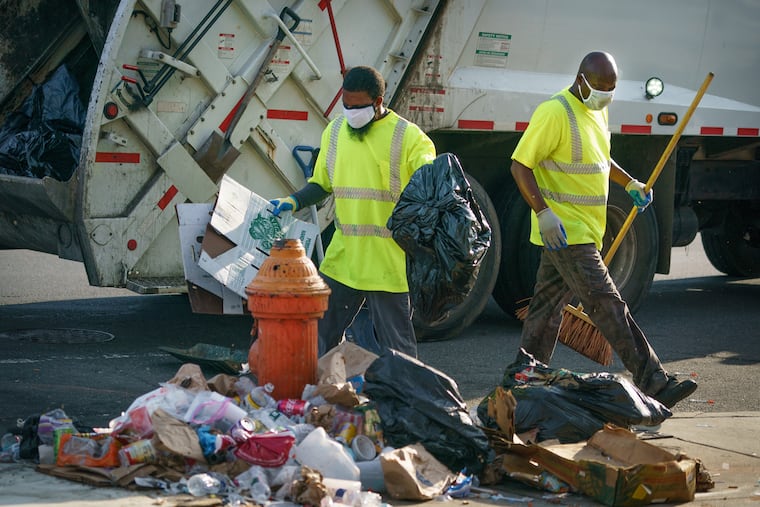Philly mixed recycling in with trash to deal with backup, but city says it will catch up
City officials acknowledge that as Philly’s sidewalks became choked with trash and storms drenched the refuse with rain, streets department workers began commingling recycling and refuse.

As Philly’s sidewalks became choked with trash in recent weeks and storms drenched recycling buckets, sanitation workers who could not keep up with the volume began commingling refuse and recycling, according to a city official.
That recycling material went either to landfills or to waste-to-steam facilities to be incinerated, said Scott McGrath, the city’s environmental services director. It happened when necessary in some neighborhoods and was not a citywide policy, he said.
McGrath said the practice would stop as soon as crews catch up. The crews, he said, were doing as instructed as the city juggles 200 trash and 70 recycling routes amid a worker shortage stemming from COVID-19.
“We are trying to keep separate collections,” McGrath said, “but there have been occasions where we’re commingling just to get caught up.”
Philadelphia and other cities have struggled to keep up with trash pickup during the pandemic as workers test positive for the virus, get sick, or are quarantined. At the same time, municipal collections have swelled because so many people are at home who would normally be at a workplace.
McGrath said heavy rain in recent weeks, particularly during Tropical Storm Isaias, soaked cardboard and paper mixed in with recycling. The waterlogged paper products could no longer be recycled. Once loads are contaminated, recycling processing facilities reject them.
While the amount of recycling being placed curbside has risen during the pandemic, the weight increase has not been much because it is mostly light plastic, he said. But the volume and weight of trash has taken a big leap.
“In those cases, we made strategic decisions to collect everything together. And that gets people upset, which is understandable. But we are also getting 30% more tonnage” of trash, McGrath said. “That’s a whole extra day of collection. That’s why we’ve struggled to keep up.”
McGrath said the situation has improved. He noted that the Streets Department is hiring 120 temporary workers. But getting back on track won’t be easy.
“Once you get behind, it causes sort of a snowball effect,” he said.
McGrath said that if workers fall behind after a snowstorm, for example, they often have a full crew returning the next week to help catch up. But with so many workers out, the city hasn’t had that option.
“We often just don’t have enough personnel,” he said. “Plus, we’re wearing our poor guys out.”
He does expect workers to make sizable progress this week, and said recycling will be back on track by Friday in most neighborhoods.
The city’s trash and separate recycling collection is a massive effort. Normally, Waste Management handles all of the city’s recycling.
However, recycling that gets mixed in with trash gets handled by either Waste Management or Covanta, a waste-to-energy facility. Both companies have contracts with the city for waste disposal.
Waste Management handles 65% of the city’s residential trash, generated primarily in Northeast, North and South Philadelphia and Center City. Waste Management takes it either to a landfill in Falls Township, Bucks County or to a nearby Wheelabrator waste-to-energy facility where it is incinerated to produce fuel for energy production.
Trash generated in Northwest and West Philadelphia goes to Covanta facilities in either Chester City or Plymouth Township, Montgomery County.
» HELP US REPORT: Are you a health care worker, medical provider, government worker, patient, frontline worker or other expert? We want to hear from you.
McGrath said that workers are not targeting any specific area for commingling of trash and recycling, or for allowing trash to pile up, but that decisions are made daily depending on the load.
“We don’t want any neighborhood disproportionately impacted,” McGrath said.
He said recycling left at drop-off centers is being recycled because that involves separate crews.